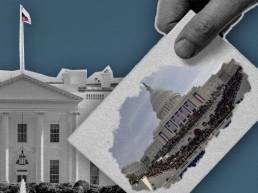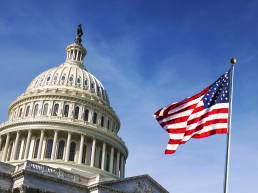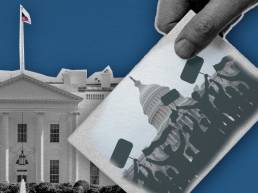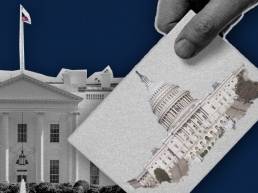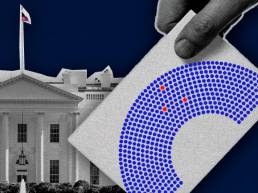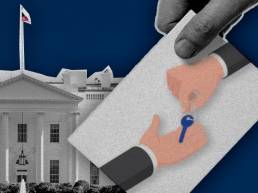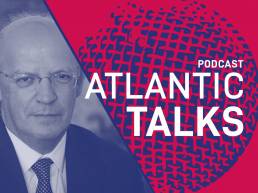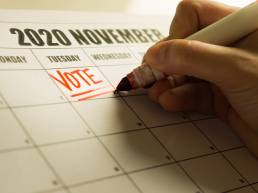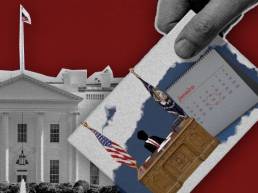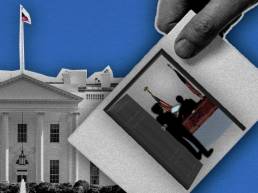18 de January, 2021
Observador Newsletter: Why does the inauguration matter?
The importance of the new president's inauguration speech. And yet, an interview…
14 de January, 2021
‘América Vinte Vinte’: Trump’s second impeachment and Biden’s start
This week, Professor Teresa Botelho and Political Consultant Lee Neves analyze…
11 de January, 2021
Observador Newsletter: How do you stop an invasion in Washington? Derrick DeMelo Interview
Analysis of the historical events that happened around joe biden's victory…
4 de January, 2021
Observador Newsletter: What is the Senator for? Interview with Margaret Lança
How does the balance of forces between the President and the Senate work? Interview…
7 de December, 2020
Observador Newsletter: What are faithless voters? Interview with Diana Marie Afonso
The Electoral College vote for the 2020 U.S. presidential election is approaching.…
1 de December, 2020
Observador Newsletter: Why is the transition so important? Interview with Rosa Rebimbas
The Republican challenge to the Democratic victory is highlighting the transition…
30 de November, 2020
Augusto Santos Silva at the Atlantic Talks
Minister of Foreign Affairs is the guest of the last episode of the Atlantic Talks.…
26 de November, 2020
‘America Vinte Vinte’: Joe Biden’s team
President Joe Biden's team and what these choices mean for the future of American…
How does the Electoral College work?
North-Americans return to the polls on November 3rd to choose the next President for the next four years. Donald Trump is the candidate for re-election representing the Republican Party and is expected to be opposed by the Democratic Party either by Vermont Senator, Bernie Sanders, or by the former Vice-President Joe Biden. Voters choose the President indirectly, through the election of the delegates that make up the Electoral College. To win, either candidate must get at least 270 delegates.
25 de January, 2021
Observador Newsletter: What can a President do in it’s first hour in office? Interview with Jim Costa
The power and limitations of governing by executive order in the United States and…
21 de January, 2021
‘América Vinte Vinte’: Biden’s inaugural adress and first decisions
This week, Nuno Severiano Teixeira, Professor and Director of IPRI-NOVA, analyzes…
18 de January, 2021
Observador Newsletter: Why does the inauguration matter?
The importance of the new president's inauguration speech. And yet, an interview…
14 de January, 2021
‘América Vinte Vinte’: Trump’s second impeachment and Biden’s start
This week, Professor Teresa Botelho and Political Consultant Lee Neves analyze…
Chronology
Iowa Caucus (3th)
The Democratic primaries began with a mix of surprise and confusion. Pete Buttigieg – the Mayor of South Bend, Indiana – scored an unexpected victory in the Iowa Caucus, and by a small margin, over the then-favorite Bernie Sanders, Senator of Vermont. The difficulties in the operation of a new vote-counting system led to the delay in the presentation and public challenge of the results.
Democratic primaries in New Hampshire (11th) and Nevada (22th)
February seemed to be Bernie Sanders’ month. After nearly tying with Pete Buttigieg in Iowa, where he even won the popular vote, Bernie Sanders won prominently in New Hampshire and Nevada, where he had the opposition (not formalized) of the powerful union representing the workers of the hospitality sector.
Democratic primary in South Carolina (29th)
After very positive results in the first three primaries, Bernie Sanders’ campaign was gaining momentum when Joe Biden did what he always said he would do – win South Carolina by attracting the Afro-American vote. The Vice-President won with more than twice the votes of the runner-up.
*In the Republican Party primary elections are also taking place, but the only candidate is Donald Trump, common in cases where presidents seek re-election for a second term.
Super Tuesday (3rd)
This Tuesday is Super because it’s the day during the primaries when more states go to the polls (14, among them California and Texas) and where the candidates can obtain about 1/3 of the delegates in the entire race. It was on Super Tuesday that Joe Biden demonstrated that he has the capacity to become the Democratic nominee, winning in 10 of the 14 states. The rest were won by Bernie Sanders, the favorite before the poll.
Mike Bloomberg drops out of the race and endorses Joe Biden (4th)
New York billionaire and media mogul, Michael Bloomberg, dropped out of the race after a disappointing result on Super Tuesday. Bloomberg promptly endorsed Biden and pledged his support for his campaign.
Elizabeth Warren drops out (5th)
After a brief period where she was considered one of the favorites, senator Warren failed to meet the goals of her campaign and announced she was suspending her campaign. She did not expressed any public preference over which candidate she though should be the Democratic nominee for the US presidential election.
Big Tuesday (10th)
Joe Biden won big once again, claiming Idaho, Michigan, Mississippi and Missouri. Senator Sanders won only in North Dakota.
Biden Wins Arizona, Florida and Illinois (17th)
Another important win for Joe Biden, who widens the gap to Bernie Sanders and claims Florida, a Swing state with a significant Latin-American community.
Democratic primaries in Wyoming, Alaska, Hawaii and Louisiana (4th)
Wisconsin Primary (7th)
Primaries in Connecticut, Delaware, Maryland, New York, Pennsylvania and Rhode Island (28th)
The day the major states of the East Coast of the United States are disputed, some of the most important in this race. New York is, among Democrats, the second with the most delegates up for grabs. Pennsylvania, one of the Swing states and part of the so-called Rust Belt, where the industrialized cities that Trump managed to win in 2016, is also in the electoral race to be disputed.
Kansas and Guam primaries (2th)
Indiana Primary (5th)
Nebraska and West Virginia primaries (12th)
Kentucky and Oregon primaries (19th)
Primaries in Columbia, Montana, New Jersey, New Mexico and South Dakota (2nd)
Democratic Caucus in the Virgin Islands (6th)
Republican Primary in Puerto Rico (7th)
Digital Democratic Convention (17th to 20th of August)
After the primary process, Democrats gather to ratify (or decide) which candidate will be nominated to face Donald Trump in the next November presidential election.
Hybrid Republican Convention in Charlotte, North Carolina (24th to 27th)
Republicans gather in Charlotte to confirm that Donald Trump will run for re-election in November. Without internal opposition, Donald Trump seeks to remain in the presidency until January 2025. The last U.S. President who failed to stand for re-election was George H. W. Bush, who lost in 1992 to Bill Clinton.
South Bend, Indiana (29th)*
The first head-to-head between the two presidential candidates. Donald Trump and the chosen ones to lead the democratic ticket will face off in Indiana, the city led by Pete Buttigieg, one of the sensations for the Democratic party at the start of this election.
*To be confirmed
Salt Lake City, Utah (7th)*
First and only debate between the two candidates for vice-president.
Ann Arbor, Michigan (15th)*
For the second time, with about two weeks to go before the final vote, the presidential candidates leading the world’s largest economy face off again in a debate.
Nashville, Tennessee (22nd)*
The third and final debate between the two candidates for president of the United States, comes just under a week before North-Americans go to the polls.
*To be confirmed
November 3rd
Election for President of the United States
What To Read, Watch and Listen To
30 de November, 2020
Augusto Santos Silva at the Atlantic Talks
Minister of Foreign Affairs is the guest of the last episode of the Atlantic Talks.…
23 de November, 2020
Observador Newsletter: the importance of the chief of staff, interview with Michael Rodrigues
Who they are and the power of men in the most powerful unelected office in American…
23 de November, 2020
Monica Ferro at the Atlantic Talks
Director of the United Nations Population Fund (UNFPA), Monica Ferro, in the new…
16 de November, 2020
Bernardo Pires de Lima at the Atlantic Talks
IPRI associate researcher and one of the most prominent international relations…

